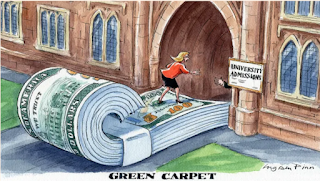Research Proposal
Working Title: The Dark Side of Merit-based College Admissions
Topic:
I will explore how the seemingly attractive principle of meritocracy exacerbates inequality by giving the elite class a greater relative advantage over the rest in gaining entry to prestigious colleges. I will discuss how it has become increasingly challenging for the low- and middle-class, who lack economic and cultural capital, to achieve social mobility. In addition, I will examine how the elite class, who seem to benefit the most from meritocracy, find themselves trapped inside the demeaning fears of not winning the meritocratic competition.
Research Question:
How does merit-based college admissions reproduce inequality and stifle social mobility? Are the affluent elite class negatively affected under such admissions system? If so, why have meritocracy become toxic even for those who benefit from it? Is there any way to make merit-based admissions game a fair play?
Theoretical Frame:
In the book The Tyranny of Merit: What's Become of the Common Good?, Michael Sandel explores why the well-intentioned principle of meritocracy has gone wrong, suggesting that not only have we failed to live up to the principle, the principle itself is flawed. Sandel points out the phenomenon, “meritocratic hubris,” in which winners tend to neglect their luck and good fortune that paved their way to success, rendering their success self-made. The disadvantaged losers, on the other hand, has become easy targets of denigration as they are considered as not having tried hard enough to achieve the American Dream. Though the affluent elite class seem to purely profit from meritocratic admissions game, they pay the price through intense and stressful preparation for selective colleges. In The Meritocracy Trap: How America's Foundational Myth Feeds Inequality, Dismantles the Middle Class, and Devours the Elite, Daniel Markovits notes that the rich are no longer the “leisure class” but are “superordinate” working class who must work longer hours in demanding jobs to maintain their inherited status and pass it on to their children. It is also worth noting how “merit” is defined and evaluated by the selective colleges as Jerome Karabel explores how the “Big Three[s]”—Harvard, Yale, and Princeton—constantly changed the definition of “merit” to admit the desired groups while excluding the unwanted minorities. In this respect, gaining entry to elite colleges does not necessarily mean that one has outstanding merits than others; it often means that they have access to resources to display the right kinds of merit that a particular college desire.
Case:
In the introduction of the book The Tyranny of Merit: What's Become of the Common Good?, Michael Sandel illustrates a famous college admissions bribery scandal, in which a college-counseling consultant named William Singer has been accused of bribing college officials and manipulating test scores in order to guarantee the rich student’s entry to selective colleges. Sandel describes such expensive yet illegal pathway as an entry through the “side door.” Besides the illegal “side door” there are “front” and “back” doors which are legal. These two doors, however, fail to disentangle from the dark side of meritocracy.
Works Cited
Karabel, Jerome. The Chosen: The Hidden History of Admission and Exclusion at Harvard, Yale, and Princeton. Houghton Mifflin Company, 2005.
Markovits, Daniel. The Meritocracy Trap: How America's Foundational Myth Feeds Inequality, Dismantles the Middle Class, and Devours the Elite. Penguin Books, 2020.
Nahai, Rebekah N. “Is Meritocracy Fair? A Qualitative Case Study of Admissions at the University of Oxford.” Oxford Review of Education, vol. 39, no. 5, 1 Jan. 2013, pp. 681–701. EBSCOhost,search.ebscohost.com/login.aspx?direct=true&db=eric&AN=EJ1023322&site=ehost-live.
Sandel, Michael J. Tyranny of Merit: What's Become of the Common Good?. Penguin Books, 2020.
Warikoo, Natasha. “What Meritocracy Means to Its Winners: Admissions, Race, and Inequality at Elite Universities in the United States and Britain.” Social Sciences (Basel), vol. 7, no. 8, MDPI AG, 2018, p. 131–, doi:10.3390/socsci7080131.

Comments
Post a Comment